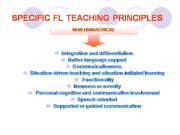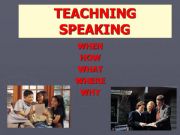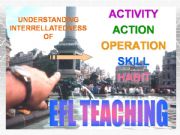
EFL TEACHING BETTER�LISTENING SKILLS �FOR BETTER�PRONUNICATION SKILLS
General features of teaching pronunciation
Teaching pronunciation is important not just because it is necessary to communicate one�s ideas clearly.
Articulation movements accompany the process of using the language not only when a person is speaking but also during listening, reading and writin...
Level: advanced
Age: 18-100
Downloads: 48
|

SPECIFIC FL TEACHING PRINCIPLES
Integration and differentiation
Native language support
Communicativeness
Situation-driven teaching and situation-initiated learning
Functionality
Newness or novelty
Personal cognitive and communicative involvement
Speech-oriented
Supported or guided communication
Level: advanced
Age: 14-17
Downloads: 20
|

What audiovisuals and technical devices should be used in EFL teaching?�
audiovisuals and technical devices in EFL teaching
Level: advanced
Age: 14-17
Downloads: 19
|

The use of informational technologies at early stages of studying the Japanese language
The use of informational technologies at early stages of studying the Japanese language
Level: advanced
Age: 14-17
Downloads: 1
|

TASK COMPONENTS AND WHAT TO DO WITH THEM
TASK COMPONENTS
AND
WHAT TO DO WITH THEM
Level: intermediate
Age: 14-17
Downloads: 1
|

TEACHING �WRITING �IN EFL �CLASSROOM Writing as communication
Types of writing
Writing can be expressive, poetic, informative and persuasive.
Depending on the type of writing, the writer concentrates either on the subject matter of the written piece, or on the reader, or on one�s own feelings and thoughts.
The triangle of the �subject matter�, �writer� ...
Level: advanced
Age: 17-100
Downloads: 48
|

TEACHNING SPEAKING
Several approaches to identifying speaking content
1) topics to discuss
2) real-life communicative situations
3) modelling the communicative process
Which of these is the most adequate form for the content of communication?
Knowledge of the world and reality is stored in the human consciousne...
Level: advanced
Age: 18-100
Downloads: 73
|

UNDERSTANDING INTERRELLATEDNESS OF ACTIVITY ACTION OPERATION SKILL HABIT
TEACHER MUST UNDERSTAND AND KNOW
how students remember and interpret rules and functions of language items
how to teach students to understand and use LI in oral and written communication
how to encourage conscious self-control of one�s speech activity
TEACHER MUST RELY ON
basic principles of s...
Level: advanced
Age: 14-17
Downloads: 22
|

Motivation and stimulation in language teaching
From motivation and stimulation parameters
of speech generation and reception to EFL teaching principles
Motivate any utterance (passive or active)
In case of no real-life motivation, suggest role-playing strategies
State the aim clearly in communicative terms.
Not necessary to explain the mo...
Level: advanced
Age: 14-17
Downloads: 50
|

TEACHING SPEAKING Dialogues and monologues
Teaching dialogue means arranging a series of training exercises to master all of its possible components � lexical and grammatical models typical of real-life communication � and to train communicative reactions to what is heard
Modify and repeat
Learn and repeat
Answer together according to the...
Level: advanced
Age: 17-100
Downloads: 40
|